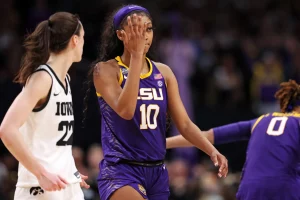 The recent Women’s NCAA basketball tournament captured the attention of the US sports watching public, something unusual for women’s sports. Games were exciting and featured players like Caitlin Clark from the University of Iowa, whose play was described in the New York Times as “transcendent” and “electrifying”. She is also a player who makes rich use of nonverbal communication on the course, raising her hand up to her ear to rouse the crowd or holding out 3 fingers on each raised hand to signal 3-pointers, her go-to shot. But she also has used gestures to “trash talk”, as in repeatedly using the “You can’t see me” celebratory gesture, popularized by wrestler John Cena.
The recent Women’s NCAA basketball tournament captured the attention of the US sports watching public, something unusual for women’s sports. Games were exciting and featured players like Caitlin Clark from the University of Iowa, whose play was described in the New York Times as “transcendent” and “electrifying”. She is also a player who makes rich use of nonverbal communication on the course, raising her hand up to her ear to rouse the crowd or holding out 3 fingers on each raised hand to signal 3-pointers, her go-to shot. But she also has used gestures to “trash talk”, as in repeatedly using the “You can’t see me” celebratory gesture, popularized by wrestler John Cena.
The use of that gesture by Clark did not generate much in the public space until last week’s championship game, won by Louisiana State University (LSU) over Iowa. In the closing minutes, LSU’s  star player, Angel Reese, herself used the gesture in front of Clark. She also held up her hand to Clark, pointing to her ring finger, meaning that she, not Clark, was going to be receiving the championship ring. After the game, Reese, who is African-American, was widely criticized for using the gestures. Reese subsequently defended herself, stating that Clark, who is White, had not been accused of disrespect for using the “You can’t see me” gesture. She also pointed out that Clark, in Iowa’s game against the University of South Carolina, had used a “wave-off” gesture to mock South Carolina guard Raven Johnson, while Johnson was on the 3-point line and Clark was at the foul line, indicating that Johnson didn’t need to be guarded because she wasn’t capable of making the 3-pointer (although later in the game she scored three 3-pointers).
star player, Angel Reese, herself used the gesture in front of Clark. She also held up her hand to Clark, pointing to her ring finger, meaning that she, not Clark, was going to be receiving the championship ring. After the game, Reese, who is African-American, was widely criticized for using the gestures. Reese subsequently defended herself, stating that Clark, who is White, had not been accused of disrespect for using the “You can’t see me” gesture. She also pointed out that Clark, in Iowa’s game against the University of South Carolina, had used a “wave-off” gesture to mock South Carolina guard Raven Johnson, while Johnson was on the 3-point line and Clark was at the foul line, indicating that Johnson didn’t need to be guarded because she wasn’t capable of making the 3-pointer (although later in the game she scored three 3-pointers).
It’s hard to see the difference in reactions to Clark and Reese as anything other than racism, holding a Black player to a higher standard than a White player. Clark herself afterwards stated that she was not bothered by Reese’s gestures and defended the right of women to engage in trash talk, as has long been customary in men’s sports.
Today is Easter on the Western Christian calendar, which this year coincides with the periods of other major religious observances, Passover and Ramadan. It should be a time of peace, reconciliation, and renewal. But conflict is rife today, from the ongoing war in Ukraine to Black Tennessee lawmakers being expelled yesterday from the state legislature (over protesting a school shooting). Violent conflict is occurring in the holy city of Jerusalem where clashes have taken place in the last few days at the Al-Aqsa Mosque, located close to historical and holy sites in Judaism and Christianity, notably that of the Temple in Jerusalem. Conflict is perhaps inevitable in sports events, where it emerges naturally from competition, but wouldn’t it be great if that were its only manifestation in human affairs? And if it took only the form of nonverbal mockery?